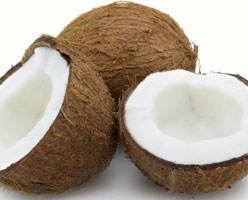- www.coconutmiracle.com
- Ethical, Original & Organic
- free uk delivery
- sales@coconutmiracle.com


The health benefits of coconut oil include hair care, skin care, stress relief, cholesterol level maintenance, weight loss, boosted immune system, proper digestion and regulated metabolism. It also provides relief from kidney problems, heart diseases, high blood pressure, diabetes, HIV, and cancer, while helping to improve dental quality and bone strength. These benefits of oil can be attributed to the presence of lauric acid, capric acid and caprylic acid, and their respective properties, such as antimicrobial, antioxidant, anti-fungal, antibacterial and soothing qualities.
Coconut oil is used extensively in tropical countries especially India, Sri Lanka, Thailand, Philippines etc., which have a good production of coconut oil. At one time, the oil was also popular in western countries like the United States and Canada, but there was a strong propaganda campaign in the 1970s spread by the corn oil and soy oil industry against coconut oil. Coconut oil was considered harmful for the human body due to its high saturated fat content until the last decade (2000s) when people began to question the claims of the propaganda. Next, lets look into some more details of how coconut oil works in our body.
How is lauric acid used by our body?
The human body converts lauric acid into monolaurin, which is supposedly
helpful in dealing with viruses and bacteria that cause diseases
such as herpes, influenza, cytomegalovirus, and even HIV. It also
helps in fighting harmful bacteria such as listeria monocytogenes
and helicobacter pylori, and harmful protozoa such as giardia lamblia.
As a result of these various health benefits of coconut oil, although
its exact mechanism of action was unknown, it has been extensively
used in Ayurveda, the traditional Indian medicinal system. The Coconut
Research Center has compiled a list of potential benefits of coconut
oil in both traditional and modern medicine.
Before we move on to the benefits of coconut oil in detail, we should
first understand its composition.
Composition of Coconut Oil:
More than ninety percent of coconut oil consists of saturated fats
(Dont panic! Its not as bad as it sounds, read to the end of this
review and your opinion may change), along with traces of few unsaturated
fatty acids, such as monounsaturated fatty acids and polyunsaturated
fatty acids. Virgin coconut oil is no different from this. Saturated
fatty acids: Most of them are medium chain triglycerides, which
are supposed to assimilate well in the bodys systems. Lauric acid
is the chief contributor, representing more than forty percent of
the total, followed by capric acid, caprylic acid, myristic acid
and palmitic.
Polyunsaturated fatty acids: Linoleic acid.
Monounsaturated fatty acids: Oleic acid.
Poly-phenols: Coconut contains Gallic acid, which is also known
as phenolic acid. These polyphenols are responsible for the fragrance
and the taste of coconut oil and Virgin Coconut Oil is rich in these
polyphenols.
Certain derivatives of fatty acid like betaines, ethanolamide, ethoxylates,
fatty esters, fatty polysorbates, monoglycerides and polyol esters.
Fatty chlorides, fatty alcohol sulphate and fatty alcohol ether
sulphate, all of which are derivatives of fatty alcohols.
Vitamin E, vitamin K and minerals such as iron.
